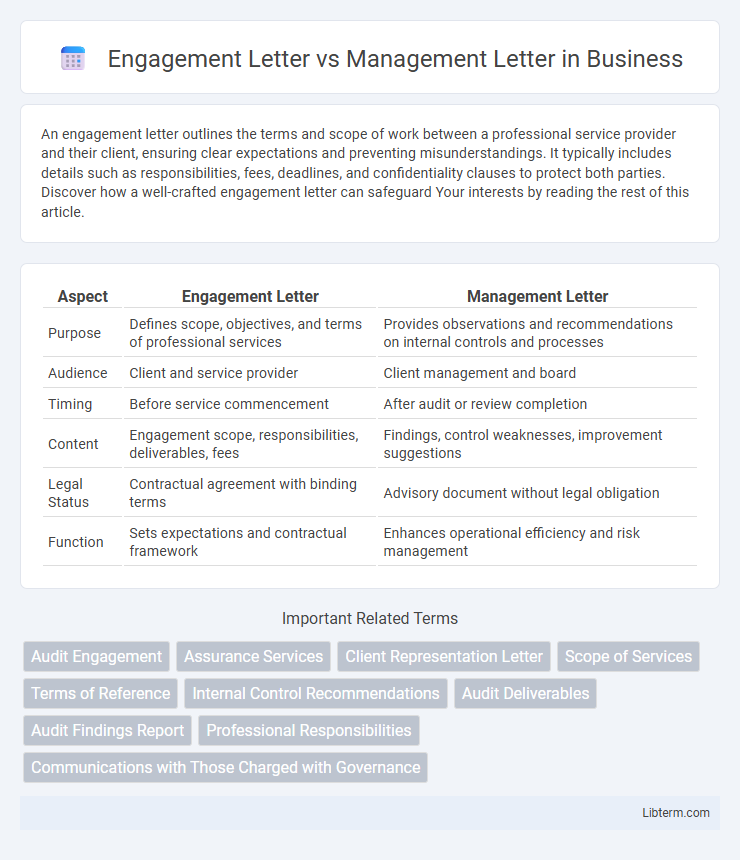An engagement letter outlines the terms and scope of work between a professional service provider and their client, ensuring clear expectations and preventing misunderstandings. It typically includes details such as responsibilities, fees, deadlines, and confidentiality clauses to protect both parties. Discover how a well-crafted engagement letter can safeguard Your interests by reading the rest of this article.
Table of Comparison
| Aspect | Engagement Letter | Management Letter |
|---|---|---|
| Purpose | Defines scope, objectives, and terms of professional services | Provides observations and recommendations on internal controls and processes |
| Audience | Client and service provider | Client management and board |
| Timing | Before service commencement | After audit or review completion |
| Content | Engagement scope, responsibilities, deliverables, fees | Findings, control weaknesses, improvement suggestions |
| Legal Status | Contractual agreement with binding terms | Advisory document without legal obligation |
| Function | Sets expectations and contractual framework | Enhances operational efficiency and risk management |
Introduction to Engagement Letters and Management Letters
Engagement letters establish the scope, objectives, and responsibilities agreed upon between an auditor and client before an audit or assurance service begins, setting clear expectations for both parties. Management letters, issued after the audit, highlight internal control weaknesses and provide recommendations for improving financial reporting and operational efficiency. These documents are critical for maintaining transparency and guiding the audit process in compliance with auditing standards.
Definition of Engagement Letter
An Engagement Letter is a formal agreement that outlines the scope, objectives, and responsibilities of both the client and the service provider in an auditing or consulting project. It serves as a legal contract detailing the terms of the engagement, including the specific services to be performed, timelines, fees, and confidentiality clauses. Unlike a Management Letter, which communicates audit findings and recommendations, the Engagement Letter establishes the foundation for the professional relationship and ensures mutual understanding before work begins.
Definition of Management Letter
A Management Letter is a formal communication prepared by auditors that highlights internal control weaknesses and operational inefficiencies identified during an audit. It provides recommendations for management to improve financial reporting processes and strengthen governance. Unlike an Engagement Letter, which outlines the scope and terms of the audit engagement, the Management Letter focuses on actionable feedback aimed at enhancing organizational controls.
Purpose of Each Letter
An engagement letter outlines the specific scope, objectives, and responsibilities agreed upon between a client and a service provider, ensuring clear expectations before services begin. A management letter highlights observations, recommendations, and improvements identified during audit or review processes, aimed at enhancing internal controls and operational efficiency. The engagement letter sets the foundation for the contractual relationship, while the management letter serves as a strategic tool for management's continuous improvement.
Key Components of an Engagement Letter
Key components of an engagement letter include the scope of services, objectives, responsibilities of both parties, and terms of engagement such as fees and timelines. It clearly defines the auditor's or consultant's role and limitations, ensuring mutual understanding and legal protection. In contrast, a management letter primarily provides recommendations and observations related to internal controls and operational improvements after the engagement is completed.
Key Components of a Management Letter
A Management Letter primarily includes key components such as observations on internal controls, recommendations for operational improvements, and identification of potential risks discovered during an audit. It emphasizes actionable insights aimed at enhancing management practices and financial reporting accuracy. Unlike an Engagement Letter, which outlines the scope, objectives, and responsibilities of the audit engagement, the Management Letter focuses on communication of findings to assist management in decision-making and risk mitigation.
Differences Between Engagement Letter and Management Letter
An Engagement Letter is a formal agreement outlining the scope, objectives, and responsibilities between a client and a service provider, typically used in auditing or consulting engagements. A Management Letter, in contrast, is a document prepared by auditors to communicate internal control weaknesses, recommendations, and observations to the client's management after completing an audit. The primary difference lies in their timing and purpose: the Engagement Letter sets the engagement terms before work begins, while the Management Letter provides feedback and improvement suggestions after the audit concludes.
Importance in the Audit Process
Engagement letters establish the formal agreement between auditors and clients, outlining the scope, objectives, and responsibilities, which is crucial for defining expectations and legal protection in the audit process. Management letters provide specific recommendations and highlight internal control weaknesses identified during the audit, serving as an essential tool for improving organizational governance and risk management. Both documents are integral to maintaining clear communication, ensuring accountability, and enhancing the overall effectiveness of the audit process.
Best Practices for Drafting Both Letters
Engagement letters should clearly define the scope, objectives, responsibilities, and deliverables, ensuring compliance with professional standards such as those from the AICPA or IFAC. Management letters must objectively communicate audit findings, control weaknesses, and recommendations, using precise, actionable language to facilitate management's corrective actions. Both letters benefit from thorough review, client acknowledgment, and customization to the specific engagement to maximize clarity, legal protection, and effective communication.
Conclusion: Choosing the Right Letter for Your Audit
Selecting the appropriate letter depends on the audit's objectives and scope, with an engagement letter setting formal terms and responsibilities between auditor and client, while a management letter highlights findings and recommendations post-audit. Engagement letters establish the foundation for a successful audit by clearly defining expectations, whereas management letters add value by improving internal controls and operational efficiency. Understanding these differences ensures effective communication and a smoother audit process.
Engagement Letter Infographic

 libterm.com
libterm.com